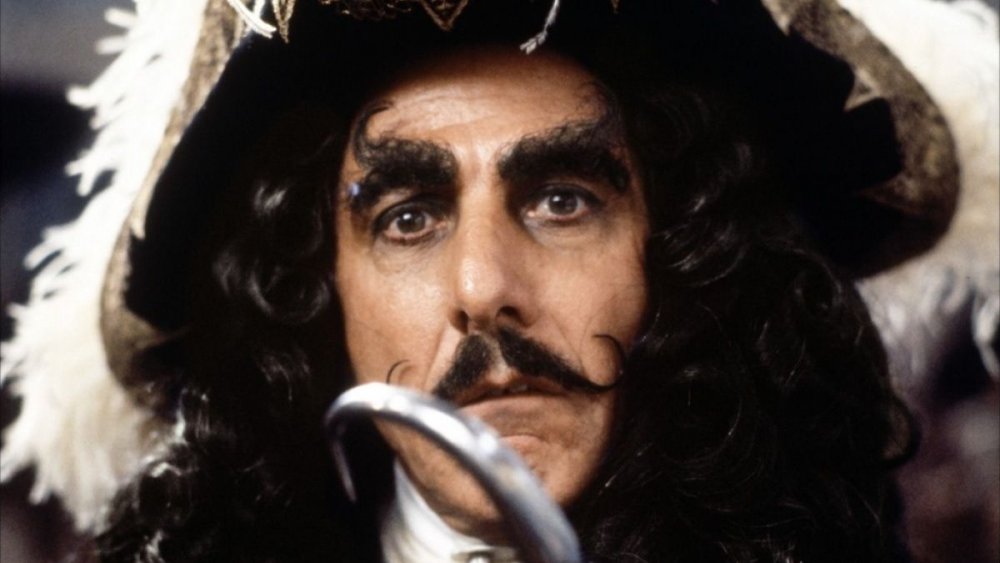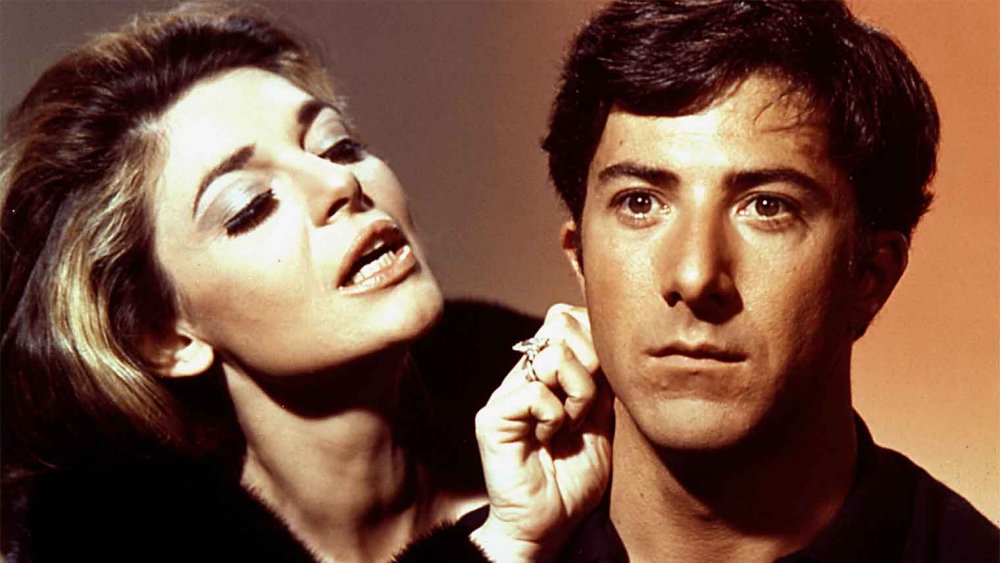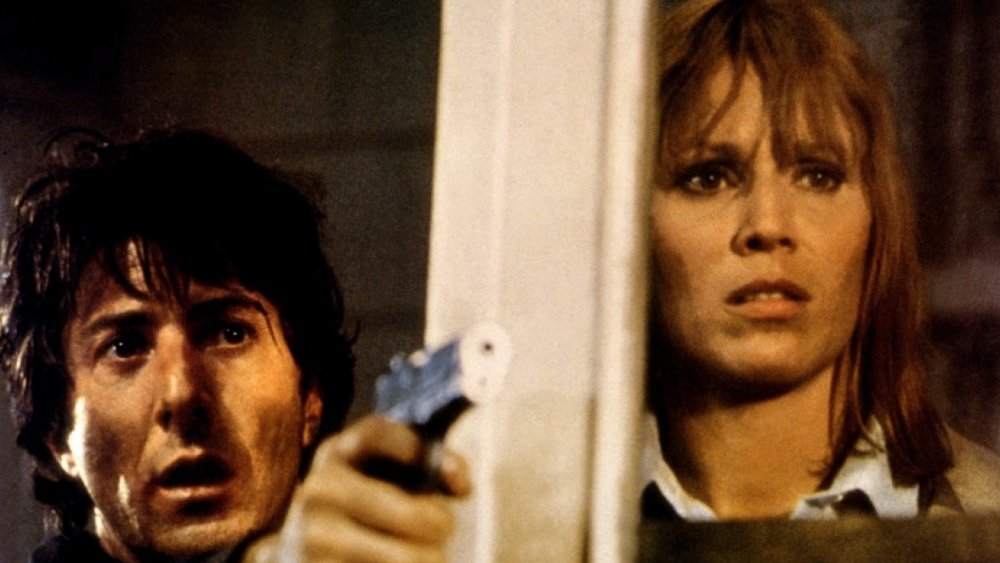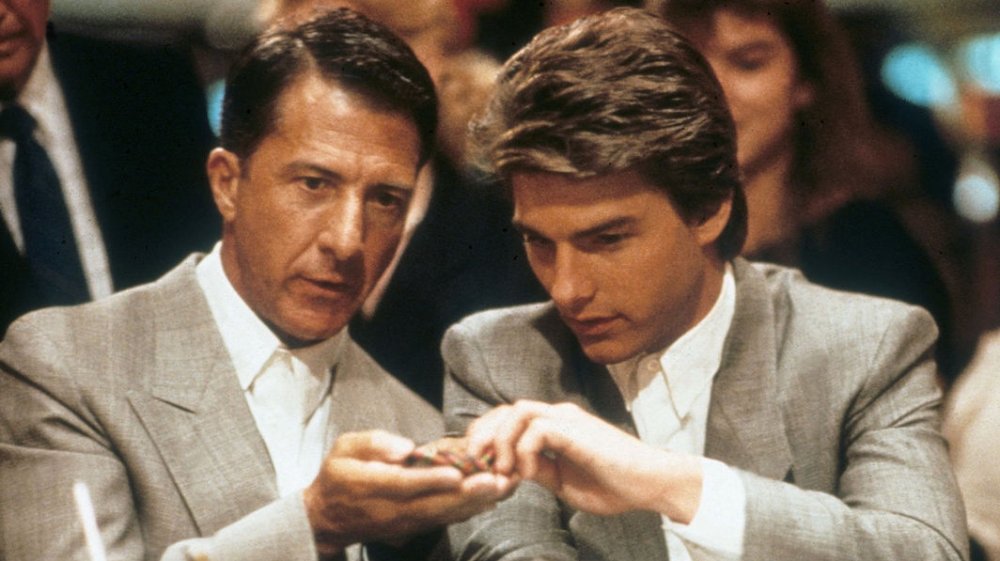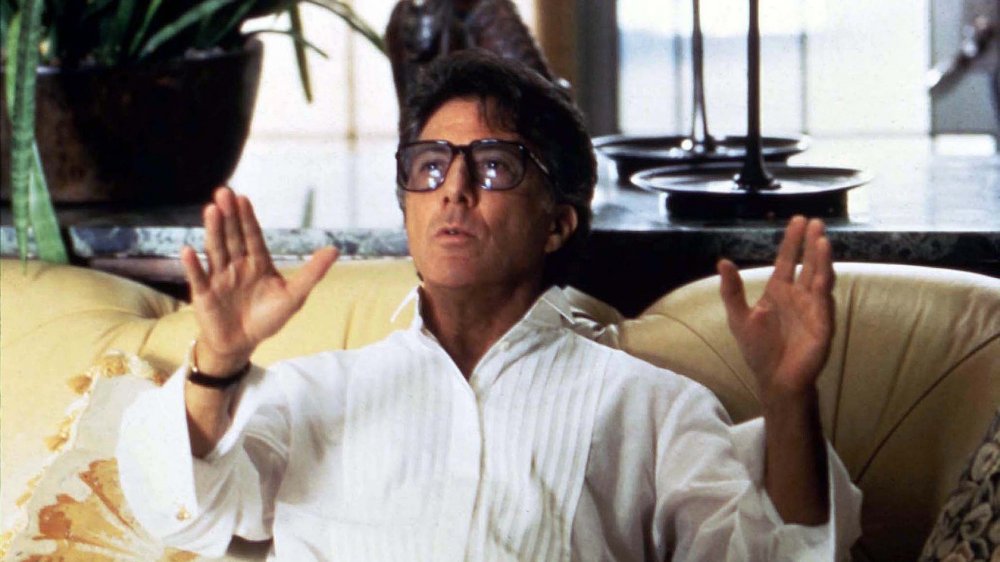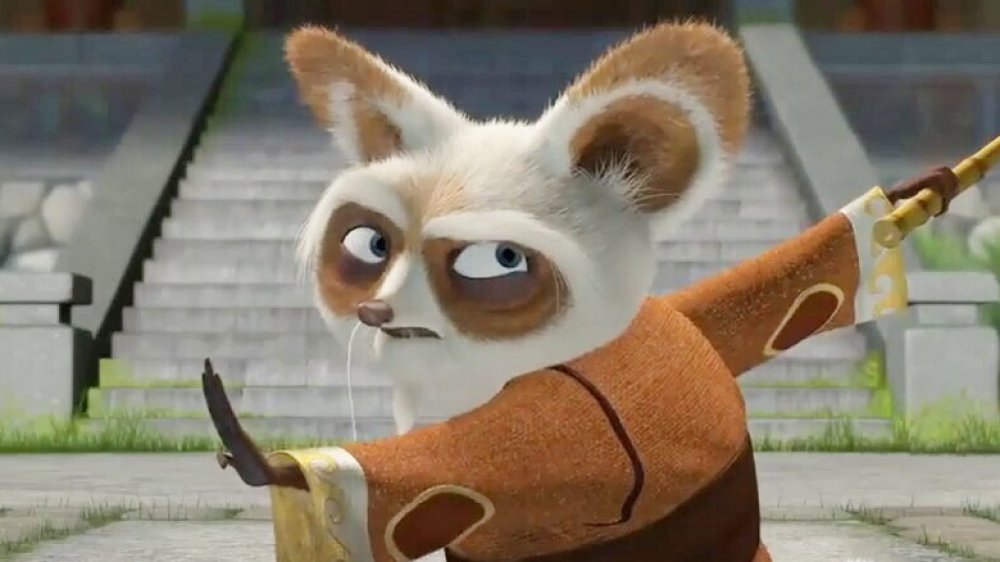Why Captain Hook From Hook Looks So Familiar
Recently, streaming audiences have been rediscovering Hook, the 1991 adventure that continues the story of Peter Pan. Directed by Steven Spielberg, the flick stars the legendary Robin Williams as an adult Peter, now a lawyer mired in the doldrums of every day life, who has forgotten all about his adventures in Neverland as a child — that is, until his old arch-nemesis, Captain Hook, kidnaps his children. Peter must return to Neverland to rescue them, reclaiming his memories and his sense of adventure along the way.
The movie features an amazing cast, including Julia Roberts as Tinkerbell, Bob Hoskins as Mr. Smee, and Maggie Smith as Wendy (portrayed in her earlier years by a 19-year-old Gwyneth Paltrow). Ah, but what about the villain at its center? He may be rather heavily made up, but if you're a true cinephile, then you know exactly who he is — and if you're having a tough time placing his face, get ready for a crash course in modern American cinema.
The actor's name is Dustin Hoffman, and he broke into Hollywood in the '60s, against the advice of a relative who told him that he wasn't good looking enough to be an actor. He's an absolute legend, having been nominated for the Academy Award for Best Actor in four separate decades (winning twice), and he's made a career out of portraying determined yet emotionally vulnerable characters who often find themselves pushed to the breaking point by dramatic circumstance.
Let's take a look back at the storied career of one of the greatest actors of his generation to discover why Captain Hook from Hook looks so familiar.
Dustin Hoffman announced his arrival with The Graduate
Hoffman never exactly fancied himself a movie star. He began as a stage actor, taking small parts and occasional TV guest roles while working odd jobs and occasionally sleeping on the kitchen floor of his buddies Gene Hackman and Robert Duvall. He secured a small part in the Arthur Hiller comedy feature The Tiger Makes Out in 1967, but later that year, film stardom came knocking: stage and screen director Mike Nichols, who had auditioned Hoffman for a role in his play The Apple Tree a couple years earlier, asked his casting director to take a look at the actor for the lead in a film he was directing. That film was The Graduate, an adaptation of the 1963 novel of the same name, and Hoffman's starring role in it instantly changed the popular consensus of what a leading man could be.
Hoffman's troubled everyman Benjamin Braddock struck a major chord with audiences. The film was a smash hit, and earned the star his first Oscar nomination for Best Actor. He quickly followed up with a starring role in the Italian comedy Madigan's Millions the next year, but in 1969, Hoffman took a gamble by lobbying director John Schlesinger for the part of Ratso Rizzo in the seedy drama Midnight Cowboy in an effort to prove his versatility.
It was a gamble that decidedly paid off, as the flick became the first and only X-rated film to win the Academy Award for Best Picture, and earned Hoffman his second Best Actor nod. For those keeping score at home, this means that two of Hoffman's first four features had scored him Oscar nominations — and he was about to enter the decade that would see him become one of Hollywood's most bankable stars.
Dustin Hoffman became one of the biggest movie stars in the world in the '70s
Hoffman's career may have started with a bang in the '60s, but in the '70s, it really began to take off in earnest. He opened the decade by starring in the revisionist Western Little Big Man, in which he portrayed Jack Crabb, a white man raised by the Cheyenne Nation. Hoffman played the character as a young adult all the way up to the age of 121. The next year, he appeared in the brutal Sam Peckinpah psychological thriller Straw Dogs, turning his somewhat meek image on its head as an American man forced to defend his home against local thugs after moving to Cornwall with his young English wife.
1974 would see Hoffman score his third Best Actor nomination: for the title role in Lenny, a biopic of the great comedian Lenny Bruce. It wasn't until 1976, though, that the actor edged to the top of the A-list with roles in two of the best films of the '70s: Marathon Man, a riveting thriller in which he re-teamed with Midnight Cowboy director John Schlesinger, and All the President's Men, a dramatization of the Watergate scandal which sunk the presidency of Richard Nixon. Hoffman and Robert Redford starred as Washington Post journalists Carl Bernstein and Bob Woodward, respectively; the widely acclaimed film was nominated for eight Oscars, although Hoffman was not nominated.
Finally, in 1979, the star was acknowledged with some hardware for his work opposite the great Meryl Streep in Kramer vs. Kramer, a portrait of a couple with a young child going through a bitter divorce. The flick won five Oscars, including Best Picture, Best Director, Best Screenplay, and acting trophies for both of its leads.
Dustin Hoffman's winning streak continued into the '80s
The massive hit films and critical accolades kept coming for Hoffman in the '80s — with one small bump in the road, which we'll get to shortly. His next film after Kramer vs. Kramer, though, was Tootsie, in which Hoffman starred as a struggling actor who dresses in drag in order to score a role on a soap opera. The flick cleaned up at the box office during the 1982 holiday season, and landed a whopping ten Oscar nominations, including another nod for Hoffman. It won only one, a Best Supporting Actress trophy for Hoffman's co-star, Jessica Lange.
Hoffman then took a brief detour into TV, appearing in the lead role in the CBS TV movie Death of a Salesman, which earned him an Emmy Award for Best Actor. Then, the bump in the road: the 1987 boondoggle Ishtar, in which Hoffman and Warren Beatty starred as hard-luck singers who get caught up in international spy games while trying to make it to a gig in Morocco. The film was absurdly expensive, was shot on location in Africa, and received absolutely brutal reviews — all of which contributed to its status as the single biggest flop of Hoffman's career.
Fortunately, his rebound was swift and decisive. He followed up Ishtar with the 1988 Barry Levinson classic Rain Man opposite hot rising star Tom Cruise, portraying an autistic savant who reconnects with his estranged brother after the death of their father. The film won four Oscars, including Best Picture, Best Screenplay, Best Director, and yet another acting statue for Hoffman.
The '90s brought one more Oscar nomination for Dustin Hoffman
Hoffman led off the '90s with a role in Beatty's ill-fated Dick Tracy before taking the antagonistic spotlight in Hook in 1991. With a few notable exceptions, many of the roles the actor would take on during that decade were in films that failed to make much of an impression; he starred in the unheralded comedy Hero in 1992, and in the military drama Sleepers in 1996 (which, despite an all-star cast and Levinson in the director's chair, nobody remembers). He also appeared opposite Dennis Franz in the David Mamet drama American Buffalo in 1996, and opposite John Travolta in the thriller Mad City in 1997. Despite all that, the star's '90s output is remembered mostly for a pair of eerily prescient features.
The first: 1995's Outbreak, which foreshadowed current events with its depiction of a deadly disease (discovered by Hoffman's character, a virologist) that sweeps across the world as the medical community races to develop a vaccine. The second: 1997's Wag the Dog, a pitch-black satire in which Hoffman portrays a Hollywood film producer who is enlisted by the U.S. political establishment to cook up a phony war in order to distract from a sex scandal involving the president. The flick, also co-written by Mamet, saw Hoffman sharing the screen with the likes of Robert De Niro, William H. Macy, Denis Leary, and Kirsten Dunst — and for his role (which was heavily based on infamous Hollywood producer Robert Evans), Hoffman scored his seventh Best Actor Oscar nomination.
Dustin Hoffman has continued to work steadily for the last two decades
Since the turn of the millenium, Hoffman has been largely content to take on smaller roles in a wide variety of projects. To name a few, he appeared in the 2002 drama Moonlight Mile, the 2003 John Grisham adaptation Runaway Jury (with his old pal Gene Hackman), and the classic 2004 comedy I Heart Huckabees. He's also taken on a voice role or two, most notably in all three installments of the Kung Fu Panda series, in which he plays Master Shifu.
The actor has also recently made a return to television in a pair of short-lived series: the HBO drama Luck, which ran for a single season between 2011 and 2012, and Medici, an Italian historical drama which has aired three seasons between 2016 and 2019. Along with a stable of veteran Italian talent, the series features Game of Thrones' Richard Madden, The Blacklist's Julian Sands, and veteran actor Brian Cox alongside Hoffman. U.S. viewers can catch the series on Netflix.
Hoffman may now be in his 80s, but he still can't seem to stay away from plying his craft. He'll next appear on the big screen in the upcoming drama As Sick as They Made Us, the feature writing and directing debut of The Big Bang Theory's Mayim Bialik. We certainly hope that he has plenty of good years of acting left in him, because it's tough to think of an actor quite so gifted or versatile.
